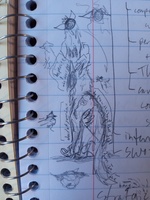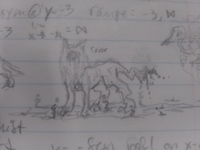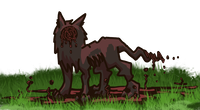Kismet
GriffyntheDragon
- Created
- 2 months, 15 days ago
- Creator
- GriffyntheDragon
- Favorites
- 0
Profile
Kismet, God of Retribution. This new and small god is actually quite shy, keeping her dog-shaped vessel away from large towns and groups of people. It has to be somewhat near to large leyline crossroads, though, since Kismet needs a lot of magic to stay alive right now. She eats the betrayers of her disciples as sustenance, if they deserve it. She's also glad for the Order of the Holy Husk, her very first cult! Well, not really a religious cult, since they're actually an organization of pro-bono lawyers who lay karma on powerful people who think they can skirt the law. But the core of their beliefs, of Retribution, of Karma, are enough to sustain Kismet when she finds herself near a Holy Husk office.
Husk, Betrayed, Crier, No-Face, Karma
This phenomenon has many names, but they all describes a shambling reanimated corpse with a vendetta. Each Husk pursues a different target, based on why they died. All Husks were betrayed by someone they loved deeply and truly, someone they were loyal to the death for. But not past death. Husks hunt their betrayer, who usually is also their killer (or the one who set their death in motion). They cannot be stopped, only run from.
Targets of husks have different fates - some are simply haunted by the Husk, a reminder of their past actions, forcing the haunted one to own up to their actions and receive judgement. These are the most common, and least lethal, Husk variety. Colloquially, they're called Haunts instead of Husks. Other, more unlucky (or more deserving) targets of Husks are killed as soon as the Husk is within range. Some Husks rip their betrayer apart before "eating" them, while others just "eat" their betrayer alive. The "eating" always happens in a public place - the crime and punishment known to as many living as possible. No one knows what happens to the hunted once they are through the strange hole that used to be the Husk's face.
After justice is served, Husks fall apart where they stand, leaving the corpse behind to be properly buried. The strange, red-black fluid that powers every Husk seems to just dissipate into thin air, restoring the corpse's face as it leaves.
-----
The first recorded Husk was a loyal dog, beaten to death by its owner. It came back and beat him to death right back. This progenitor Husk is the only one that did not immediately dissipate after its betrayed's death. There are many theories as to why this Husk behaves differently, and why it seems to be the first-ever Husk.
- The dog's corpse was dumped at a major leyline crossroads, causing the magic there to pool in the dog's body and fuel its corpse with its lingering fear, loyalty, and betrayal. With this theory, if the progenitor Husk is eliminated, then there should be no other Husks from then on.
- The dog had a newly mutated fungal infection in its body upon its death, which then rapidly mutated to become a body-puppeting fugus that only lasts as long as it can keep the last echoes of brain activity sustained, namely keep the sense of anger and betrayal alive within the body. This theory has few proponents, as it does not cover why or how the Husk's faces are restored after the "brain echoes" are satisfied.
- Husks are a mass fey-created illusion meant to let them steal away more mortals to play with, with the first Husk as the focus of the spell. This theory has been disproven by both Professor Vinwhol's fey contacts and the Fairy Queen herself, after the first Huskhater mob incursion into the Feywilds. It would also be dispelled with the destruction of the first Husk, if it were true.
- The dog's corpse is now the vessel of a new god of justice. This theory has themost merit to it, despite the unlikeliness of a new god spawning outside of a Pantheon. If this teory is correct, then the Order of the Holy Husk has actually been empowering the new god, explaning how Husks have spread across the entire continent in the short span of time since the first Husk. This also explains the restoration of the faces, and why the Husks "eat" their betrayers - the bodies feed the new god.



Comments